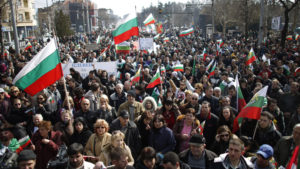Kelly Warner Law Firm Blames USA Herald for Arizona Bar Investigation
4/18/17 The Washington Post exposes another questionable Kelly Warner filing that involves former NFL Cheerleader Megan Welter: https://www.washingtonpost.com/news/volokh-conspiracy/wp/2017/04/18/another-trick-to-try-to-get-mainstream-media-articles-deindexed-by-google/?utm_term=.22e9e1615271 4/20/17 The USA…
By – USA HeraldAaron Kelly Law Firm Resorts To Attacking Former Client Again On KellyWarnerLaw.com – Pattern Recognized
In the affidavit, which was apparently signed by “Barri Grossman,” Grossman admits to all liability for the posting and absolved…
By – Jeff WattersonArizona Bar Opens Investigation on Attorney Aaron Kelly
Volokh, as part of his investigative work, had a private investigator research the defendants in some of theallegedly fraudulent…
By – Paul O'NealVast $500M Funding Fuels Race to Build the Next Generation of Space Stations
Major Investors Back the Vision The financing round was led by Balerion Space Ventures, with participation from a roster of…
By – Rihem AkkoucheAlexander Brothers Sex-Trafficking Trial Heads to Jury After Dramatic Closing Arguments
Defense: Playboy Lifestyle, Not Criminal Conduct During marathon closing arguments spanning Tuesday and Wednesday, defense attorneys urged jurors to look…
By – Rihem AkkoucheSavannah Guthrie Return to NBC Planned Amid Ongoing Search for Missing Mother
Mystery Surrounds Disappearance of Nancy Guthrie The broadcaster has been absent from the air since late January, just days before…
By – Rihem AkkoucheSupreme Court Ruling on Tariff Refunds Sparks Major Legal Push by Businesses
Judge Orders Government to Issue Refunds The drama escalated Wednesday when the Manhattan-based trade court moved swiftly. Senior Judge Richard…
By – Rihem AkkoucheTrump, Bondi TikTok Assets Sale Suit Ignites New Legal Battle in Washington
Law Meant to Counter Chinese Influence The controversy traces back to legislation passed by Congress two years ago, aimed at…
By – Rihem AkkoucheTrump Fires Kristi Noem in Surprise Cabinet Shake-Up
Behind the Decision According to an administration official, the president’s decision followed what they described as a “culmination of leadership…
By – Rihem AkkoucheVast $500M Funding Fuels Race to Build the Next Generation of Space Stations
Major Investors Back the Vision The financing round was led by Balerion Space Ventures, with participation from a roster of…
By – Rihem AkkoucheAlexander Brothers Sex-Trafficking Trial Heads to Jury After Dramatic Closing Arguments
Defense: Playboy Lifestyle, Not Criminal Conduct During marathon closing arguments spanning Tuesday and Wednesday, defense attorneys urged jurors to look…
By – Rihem AkkoucheSavannah Guthrie Return to NBC Planned Amid Ongoing Search for Missing Mother
Mystery Surrounds Disappearance of Nancy Guthrie The broadcaster has been absent from the air since late January, just days before…
By – Rihem AkkoucheSupreme Court Ruling on Tariff Refunds Sparks Major Legal Push by Businesses
Judge Orders Government to Issue Refunds The drama escalated Wednesday when the Manhattan-based trade court moved swiftly. Senior Judge Richard…
By – Rihem AkkoucheTrump, Bondi TikTok Assets Sale Suit Ignites New Legal Battle in Washington
Law Meant to Counter Chinese Influence The controversy traces back to legislation passed by Congress two years ago, aimed at…
By – Rihem AkkoucheTrump Fires Kristi Noem in Surprise Cabinet Shake-Up
Behind the Decision According to an administration official, the president’s decision followed what they described as a “culmination of leadership…
By – Rihem AkkoucheVast $500M Funding Fuels Race to Build the Next Generation of Space Stations
Major Investors Back the Vision The financing round was led by Balerion Space Ventures, with participation from a roster of…
By – Rihem AkkoucheAlexander Brothers Sex-Trafficking Trial Heads to Jury After Dramatic Closing Arguments
Defense: Playboy Lifestyle, Not Criminal Conduct During marathon closing arguments spanning Tuesday and Wednesday, defense attorneys urged jurors to look…
By – Rihem AkkoucheSavannah Guthrie Return to NBC Planned Amid Ongoing Search for Missing Mother
Mystery Surrounds Disappearance of Nancy Guthrie The broadcaster has been absent from the air since late January, just days before…
By – Rihem AkkoucheSupreme Court Ruling on Tariff Refunds Sparks Major Legal Push by Businesses
Judge Orders Government to Issue Refunds The drama escalated Wednesday when the Manhattan-based trade court moved swiftly. Senior Judge Richard…
By – Rihem AkkoucheTrump, Bondi TikTok Assets Sale Suit Ignites New Legal Battle in Washington
Law Meant to Counter Chinese Influence The controversy traces back to legislation passed by Congress two years ago, aimed at…
By – Rihem AkkoucheTrump Fires Kristi Noem in Surprise Cabinet Shake-Up
Behind the Decision According to an administration official, the president’s decision followed what they described as a “culmination of leadership…
By – Rihem AkkoucheNASA Pushes Lunar Return to 2028 Amid Artemis Program Timeline Revision
The revised Artemis III flight will serve primarily as a systems verification mission, testing docking procedures and integration capabilities with…
By – Ahmed BoughallebU.S. And Israel Launch Major Strikes On Iran — What It Means For America
A World on Edge The strikes have stirred bipartisan debate in Washington, with some lawmakers praising decisive action and others warning…
By – Samuel LopezU.S. Court of Appeals for the Ninth Circuit Overturns $8M Asbestos Verdict Against BNSF Railway Co.
Writing for the panel, U.S. Circuit Judge Morgan B. Christen concluded that BNSF’s actions fell squarely within that exception. Federal…
By – Tyler BrooksMissing DNA Evidence May Limit Investigation Into Nancy Guthrie Case, Sources Suggest
As the investigation enters its fourth week, authorities have not publicly identified any suspect or person of interest. Law enforcement…
By – Ahmed BoughallebGrand Theft Auto 6 Targets November 2026 Launch as Price Leak Fuels $100 Debate
Rockstar’s parent company, Take-Two Interactive, has not issued formal confirmation regarding final pricing. A Billion-Dollar Production Reports suggest GTA 6…
By – Ahmed Boughalleb40 Million Under Blizzard Warnings as Major Winter Storm Threatens U.S. East Coast
Weather experts said the storm is notable because of its scale across densely populated regions. Cody Snell, a meteorologist with…
By – Tyler BrooksVast $500M Funding Fuels Race to Build the Next Generation of Space Stations
Major Investors Back the Vision The financing round was led by Balerion Space Ventures, with participation from a roster of…
By – Rihem AkkoucheAlexander Brothers Sex-Trafficking Trial Heads to Jury After Dramatic Closing Arguments
Defense: Playboy Lifestyle, Not Criminal Conduct During marathon closing arguments spanning Tuesday and Wednesday, defense attorneys urged jurors to look…
By – Rihem AkkoucheSavannah Guthrie Return to NBC Planned Amid Ongoing Search for Missing Mother
Mystery Surrounds Disappearance of Nancy Guthrie The broadcaster has been absent from the air since late January, just days before…
By – Rihem AkkoucheSupreme Court Ruling on Tariff Refunds Sparks Major Legal Push by Businesses
Judge Orders Government to Issue Refunds The drama escalated Wednesday when the Manhattan-based trade court moved swiftly. Senior Judge Richard…
By – Rihem AkkoucheTrump, Bondi TikTok Assets Sale Suit Ignites New Legal Battle in Washington
Law Meant to Counter Chinese Influence The controversy traces back to legislation passed by Congress two years ago, aimed at…
By – Rihem AkkoucheTrump Fires Kristi Noem in Surprise Cabinet Shake-Up
Behind the Decision According to an administration official, the president’s decision followed what they described as a “culmination of leadership…
By – Rihem AkkoucheFDA Announces Recall of Rhino Choco VIP 10X Supplement After Undeclared Erectile Dysfunction Drug Found in Chocolate Product
Individuals with diabetes, heart disease, high cholesterol or high blood pressure are particularly vulnerable, as many patients in these groups…
By – Ahmed BoughallebWhen The Files Are Finally Unsealed The Most Mind-Bending Truth May Not Be What We Expect
[USA HERALD] – There is a widespread assumption that if governments release their most highly classified files related to unidentified…
By – Samuel LopezCivil Rights Icon Rev. Jesse Jackson Dies at 84 As President Trump Issues Personal Tribute
From Civil Rights Marches to Presidential Campaigns Jackson was not merely a witness to history — he sought to shape…
By – Samuel LopezClues to Savannah Guthrie Missing Mom’s Disappearance Found on Security System
Savannah Guthrie Questions New Security System Footage The footage captured by the home’s “Security System” has become a focal point…
By – Jackie AllenMike Tyson Urges Americans to ‘Eat Real Food’ in Emotional Super Bowl Ad Highlighting Health Risks
Boxing legend Mike Tyson is using his platform ahead of Super Bowl 60 to address a personal and national health…
By – Tyler BrooksDeadly “Death Cap” Mushrooms in California Cause Multiple Deaths and Liver Transplants Amid Rare Super Bloom
California health officials are warning the public after four deaths and three liver transplants linked to the highly toxic death…
By – Ahmed BoughallebCadillac Names Inaugural Formula 1 Car MAC-26 in Tribute to Mario Andretti Ahead of 2026 Australian Grand Prix Debut
Team CEO Dan Towriss described the MAC-26 name as a reflection of Andretti’s pioneering spirit and the broader belief that…
By – Ahmed BoughallebNorway Tops Medal Table After Day 13 at 2026 Winter Olympics as Team USA Surges Into Second Place
Upcoming Medal Events Medal competition continues Friday, February 20, with several key finals scheduled. Events awarding medals include: Women’s ski…
By – Ahmed BoughallebOlympic Science Explained: How Figure Skaters Spin at Blinding Speeds Without Getting Dizzy
By – Tyler Brooks
Olympic Villages Run Out of Condoms at 2026 Milan-Cortina Games
Condom supplies in the Olympic Villages at the 2026 Winter Games have been temporarily depleted, the Milan-Cortina organizing committee confirmed,…
By – Tyler BrooksArizona Authorities Escalate Search for Savannah Guthrie’s Mom to a Criminal Investigation
No other caregivers or family members are missing, and authorities say the family has been fully cooperative throughout the investigation.…
By – Jackie AllenWhat is Aegosexuality?
An aegosexual person might enjoy sexual thoughts, fantasies, or erotic material — but without imagining themselves as an active participant.…
By – Jackie AllenNo posts found.
No posts found.
 No comments yet. Be the first to comment!
No comments yet. Be the first to comment!


 However, Bulgarians have increasingly been alienated from politics, because for the first two decades the old Communists, renamed Socialists, and the inexperienced fledgling Democrats alternated in power, without significant improvements in the standard of living of most Bulgarians. As a result of the worldwide financial crisis of 2008 and 2009, a new generation of Westernized Bulgarians have come of age politically. In 2009, a new party, named Citizens for the European Development of Bulgaria, under the leadership of Boyko Borisov assumed power in Sofia. Now, into his third term, he leads a coalition government that faces numerous challenges.
For starters, the coalition government would like to serve out the full four years of its mandate. This would be a historic accomplishment, because before this year, no government has survived for the duration of its electoral term. Having learned from past mistakes and under the leadership of Prime Minister Boyko Borisov, the coalition partners published a program entitled “Priorities for Governance 2017-2021” that entails a detailed concept of the new government. The 128-page document’s main focus is on the economy and the social sphere. Out of the twenty one chapters eight are devoted to stable and sustainable economic growth, financial stability, zero budget deficit, and improving the standard of living of every Bulgarian. Moreover, the program aims to reduce red tape on businesses, in particular small and medium sized ones, attract foreign investments, and develop existing capital markets.
However, Bulgarians have increasingly been alienated from politics, because for the first two decades the old Communists, renamed Socialists, and the inexperienced fledgling Democrats alternated in power, without significant improvements in the standard of living of most Bulgarians. As a result of the worldwide financial crisis of 2008 and 2009, a new generation of Westernized Bulgarians have come of age politically. In 2009, a new party, named Citizens for the European Development of Bulgaria, under the leadership of Boyko Borisov assumed power in Sofia. Now, into his third term, he leads a coalition government that faces numerous challenges.
For starters, the coalition government would like to serve out the full four years of its mandate. This would be a historic accomplishment, because before this year, no government has survived for the duration of its electoral term. Having learned from past mistakes and under the leadership of Prime Minister Boyko Borisov, the coalition partners published a program entitled “Priorities for Governance 2017-2021” that entails a detailed concept of the new government. The 128-page document’s main focus is on the economy and the social sphere. Out of the twenty one chapters eight are devoted to stable and sustainable economic growth, financial stability, zero budget deficit, and improving the standard of living of every Bulgarian. Moreover, the program aims to reduce red tape on businesses, in particular small and medium sized ones, attract foreign investments, and develop existing capital markets.






































